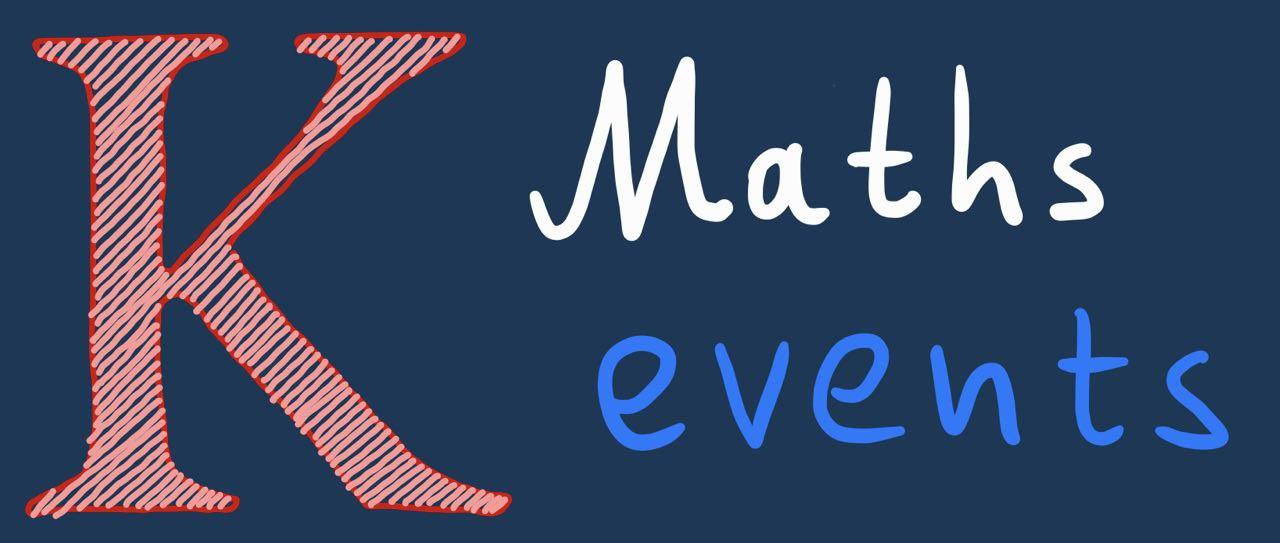Week 24.11.2024 – 30.11.2024
Monday (25 Nov)
PR KCL Probability Seminar: Critical phenomena in intermediate dimensions
regular seminar Pierre-François Rodriguez (Imperial College London)
| at: 14:00 - 15:00 KCL, Strand room: S3.32 abstract: | The talk will focus on recent developments regarding the (near-)critical behaviour of certain statistical physics models with long-range dependence in dimensions larger than 2, but smaller than 6, above which mean-field behaviour is known to set in. This “intermediate” regime remains a great challenge for mathematicians. The models revolve around a certain percolation phase transition that brings into play very natural probabilistic objects, such as random walk traces and the Gaussian free field. Keywords: |
Tuesday (26 Nov)
ME When one size must fit all: Designing an Open University statistics module
regular seminar Karen Vines (Open University)
| at: 15:00 - 16:00 KCL, Strand room: S2.30 abstract: | At the Open University our undergraduate teaching model, supported open learning, is planned to work at scale. This means individual statistics modules need to meet the requirements of multiple groups simultaneously. That is, the same module needs to work for a number of qualifications (degree programmes), with students having a wide range of backgrounds and studying in different circumstances. In this talk I will describe how we aim to achieve this, with reference to one particular module “Applied statistical modelling (M348)”. Keywords: |
Wednesday (27 Nov)
DS Fading ergodicity
regular seminar Lev Vidmar (Jožef Stefan Institute, Ljubljana)
| at: 13:30 - 14:30 KCL, Strand room: S5.20 abstract: | We uncover a novel ergodic regime dubbed "fading ergodicity". This is a regime in which a quantum system is still ergodic, however, it also acts as a precursor of the ergodicity breaking phase transition. In other words, "fading" ergodicity is a synonym of the "fading" colors of the leafs that are just about to fall off the tree. We conjecture this regime to be a generic property of quantum systems approaching the ergodicity breaking phase transition, and therefore, one cannot make a system nonergodic without first making the ergodicity fade.
|
TP Entropy in gravitational von Neumann algebras
Regular Seminar Antony Speranza (University of Illinois, Urbana-Champaign)
| at: 14:00 - 14:01 KCL Strand room: K3.11 abstract: | Entanglement entropy in quantum field theory is UV-divergent, which makes it a challenging quantity to analyze from an algebraic perspective. In this talk, I will describe how perturbatively coupling to gravity improves this situation, resulting in a well-defined notion of renormalized entropy in the semiclassical limit. This entropy is constructed using techniques from the theory of von Neumann algebras, and agrees with the generalized entropy of a subregion, consisting of the sum of the quantum field entanglement entropy and the area of the entangling surface. As an application, I will show how to derive the generalized second law for black hole horizons in terms of this renormalized entropy. Time permitting, I will also discuss a construction of a gravitational von Neumann algebra in a slow-roll inflation background, and describe how the background provides an intrinsic notion of a cosmological observer. Keywords: |
Thursday (28 Nov)
AN A counterexample to the Weak Shanks Conjecture
regular seminar Daniel Seco (Universidad de La Laguna)
| at: 11:00 - 12:00 KCL, Strand room: S5.20 abstract: | We give an example of a function $f$ non-vanishing in the closed bidisk and the affine polynomial minimizing the norm of $1-pf$ in the Hardy space of the bidisk among all affine polynomials $p$. We show that this polynomial vanishes inside the bidisk. This provides a counterexample to the weakest form of a conjecture due to Shanks that has been open since 1980, with applications that arose from digital filter design. This counterexample has a simple form and follows naturally from previous work, where the phenomenon of zeros seeping into the unit disk was already observed for similar minimization problems in one variable. Keywords: |
ST Robust detection of lead-lag relationships in lagged multi-factor models
regular seminar Alex Shestopaloff (Queen Mary )
| at: 14:00 - 15:00 KCL, Strand room: Strand 4.29 abstract: | In multivariate time series systems, key insights can be obtained by discovering lead-lag relationships inherent in the data, which refer to the dependence between two time series shifted in time relative to one another, and which can be leveraged for the purposes of control, forecasting or clustering. We develop a clustering-driven methodology for robust detection of lead-lag relationships in lagged multi-factor models. Within our framework, the envisioned pipeline takes as input a set of time series, and creates an enlarged universe of extracted subsequence time series from each input time series, via a sliding window approach. This is then followed by an application of various clustering techniques, (such as k-means and spectral clustering), employing a variety of pairwise similarity measures, including nonlinear ones. Once the clusters have been extracted, lead-lag estimates across clusters are robustly aggregated to enhance the identification of the consistent relationships in the original universe. We establish connections to the multireference alignment problem for both the homogeneous and heterogeneous settings. Since multivariate time series are ubiquitous in a wide range of domains, we demonstrate that our method is not only able to robustly detect lead-lag relationships in financial markets, but can also yield insightful results when applied to an environmental data set. Keywords: |
